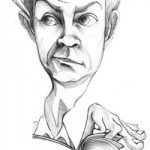The Conscience of Nunavut
After 25 years with the Nunatsiaq News, some would say Jim Bell is too hard on the troubled territory. Others say he's just what it needs
In Inuktitut, the word used for news is pivalliajut. Its literal translation is “things that are gradually developing.” For Jim Bell, editor of the weekly Nunavut newspaper, Nunatsiaq News, things always seem to be developing too gradually. This early November morning, for instance, he is fed up with the persistence of fetal alcohol syndrome (FAS) in the territory. In a story meeting with his staff, he is twitching with frustration about a Government of Nunavut (GN) “pilot project” to teach women about the dangers of drinking while pregnant. At 52, Bell is robust and fit, with silvering hair that waves dashingly at his brow, and a full beard that comes and goes according to the dictates of his vanity. His face reaches its height of handsomeness at moments like this one, consumed with confusion and contempt, as he reflects that FAS has been “news” for more than 10 years. “Maybe,” he says, “people are doing it even though they know it will harm their babies.”
Bell has even less time for the government’s concern that the education campaign might be experienced as “scolding” by mothers who already have children with FAS.
“This is not about the moms, it’s about the kids. Why does it matter if a mother feels bad or not? She already knows she’s damaged her child,” says Bell. He then focuses on the government. “What kind of moral thinking do these people do? It’s ridiculous.”
“I don’t know,” ventures Sara Minogue, the assistant editor. “I guess they’re just sensitive people, unlike others.”
“They’re idiots,” Bell retorts.
Few Nunatsiaq readers would be surprised by this outburst. It echoes the indignation often typical of Bell’s written voice, which has made him a household name in Nunavut. At times teetering between outrage and outrageousness, Bell’s weekly editorial keeps a relentless watch on the foibles of Nunavut’s leaders and is the source of both dread and delight across the territory. Kenn Harper, a prominent Iqaluit entrepreneur and author who has lived in the North for almost 40 years, calls Bell “the conscience of Nunavut.” Jack Hicks, another well-known personality in Iqaluit who worked as director of evaluation and statistics at the GN, says Bell is one of the few voices raising debate in Nunavut. And Hunter Tootoo, one of the younger and more confrontational members of legislative assembly in the GN, says he has heard people on the street say, “Jim Bell’s running the government.”
Some Nunavummiut say Bell walks around with a dark cloud over his head and sees “the cup” of the new territory as not half but almost completely empty. He does tend to dwell, at times rather gloomily, on the hurts in Nunavut. But the truth is, there are many hurts. Nunavut has fallen far short of the many hopes pinned on its creation, with 27 per cent of all its deaths between 1999 and 2003 attributable to suicide; a higher rate of violent crime than anywhere else in Canada; and more students dropping out of high school than graduating.Nunatsiaq News reports on these problems – sometimes to the point that there appears to be little other news. While some readers find the paper’s coverage too negative, many others are grateful that it brings the real stories of Nunavut out into the open. Such a job might call for a person with a bit of a dark cloud over his head – a person who, like Bell, thinks “we are ennobled as much by our defeats as by our victories.”
To read the rest of this story, please see our ebook anthology: RRJ in Review: 30 Years of Watching the Watchdogs.
It can be purchased online here.















